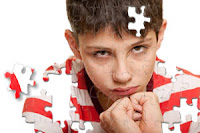Based on the challenges that Autism Spectrum Disorders (ASD) present, it’s no surprise that kids and teens diagnosed with Asperger’s (AS) and High-Functioning Autism (HFA) often have behavioral and emotional problems. These challenges are most often connected to social deficits associated with the disorder (e.g., when the youngster fails to take his turn in a playground game because he doesn't understand the social rules of an activity).
These challenges frequently involve feelings of stress, loss of control, or the inability to predict outcomes. Therefore, children with AS and HFA typically have behavior problems connected to their inability to function in a world they see as unpredictable and threatening. As a result, they may behave in ways that appear mean-spirited or malicious. But, this is an unfair assessment. While these “special needs” children do have behavioral difficulties, their problems are most often associated with their social ineptness, an obsessive interest in a particular topic, sensory sensitivities, and a defensive panic reaction (just to name a few).
==> Teaching Social Skills and Emotion Management to Children and Teens with Asperger's and High-Functioning Autism
The symptoms of AS and HFA can vary greatly from child to child depending on the severity of the disorder. Symptoms may even go unrecognized for younger kids who have mild or less debilitating deficits. Indicators that require evaluation by an ASD professional include:
These challenges frequently involve feelings of stress, loss of control, or the inability to predict outcomes. Therefore, children with AS and HFA typically have behavior problems connected to their inability to function in a world they see as unpredictable and threatening. As a result, they may behave in ways that appear mean-spirited or malicious. But, this is an unfair assessment. While these “special needs” children do have behavioral difficulties, their problems are most often associated with their social ineptness, an obsessive interest in a particular topic, sensory sensitivities, and a defensive panic reaction (just to name a few).
==> Teaching Social Skills and Emotion Management to Children and Teens with Asperger's and High-Functioning Autism
The symptoms of AS and HFA can vary greatly from child to child depending on the severity of the disorder. Symptoms may even go unrecognized for younger kids who have mild or less debilitating deficits. Indicators that require evaluation by an ASD professional include:
- abnormally intense or focused interest
- absence or impairment of imaginative and social play
- clumsy, un-coordinated movements
- excessive lining up of toys or objects
- impaired ability to initiate or sustain a conversation with others
- impaired ability to make friends with peers
- inflexible adherence to specific routines or rituals
- lack of empathy
- naïve, inappropriate, or one-sided social interactions
- no smiling or social responsiveness
- odd postures
- poor eye contact
- poor non-verbal communication
- preoccupation with certain objects or subjects
- repetitive or unusual use of language
For many young people with AS and HFA, symptoms improve with age and behavioral treatment. During the teenage years, some young people on the autism spectrum may become depressed or experience behavioral problems, and their treatment may need some modification as they transition to adulthood. Some young adults on the spectrum continue to need services and supports as they get older, but depending on severity of the disorder, they may be able to work successfully and live independently or within a supportive environment.
A defining feature of AS and HFA is that children with the disorder generally experience normal intellectual and language development. However, given the diagnostic importance of this variable, surprisingly little is known about the cognitive abilities of these children. Some researchers have reported an uneven cognitive profile pattern on individualized IQ tests (e.g., Wechsler intelligence scales) in children with HFA, including a significantly higher Performance IQ when compared to Verbal IQ scores.
Subjects with HFA specifically obtained their highest scores on the Block Design subtest and their lowest scores on the Comprehension subtest of the Wechsler scales. Based on their Block Design performance, some have inferred that children with AS and HFA have relative strength on nonverbal concept-formation tasks, specifically those that require perceptual organization, spatial visualization, abstract conceptualization, and general intelligence. On the other hand, relatively poor performance has been reported in areas requiring an understanding of social mores and interpersonal situations, social judgment, common sense, and grasp of social conventionality.
In one of the few studies of cognitive abilities of kids and teens with AS, researchers assessed the cognitive profiles of 37 subjects, as measured by the Wechsler scales. The scores generally fell within the average range of abilities, although the IQs ranged from intellectually deficient to superior. The Verbal IQ and Performance IQ scores showed no significant differences.
Consistent with the findings of other studies, the study did reveal relatively high Block Design subtest scores. These findings suggest generally strong nonverbal reasoning ability and visual-motor spatial integration skill. The Coding subtest revealed relatively low scores, suggesting that many of the subjects had visual-motor coordination difficulties, were distractible, were disinterested in school-related tasks, and had visual memory weakness. The children also obtained relatively low scores on the Comprehension subtest, suggesting poor social judgment. However, this and other studies on this topic have generally failed to identify a specific cognitive profile for children diagnosed with AS and HFA.
==> Teaching Social Skills and Emotion Management to Children and Teens with Asperger's and High-Functioning Autism
Even though there are a number of deficits associated with AS and HFA, there are numerous positives as well. For example, most children and teens of the autism spectrum:
- pay attention to detail, sometimes with painstaking perfection
- are not very concerned about their external appearance in comparison to their “typical” peers, worrying less concerning hairstyles, brand names as well as other expensive and unimportant externals that most people worry about
- have the ability to focus on tasks for a long period of time without needing supervision or incentive
- are not restricted to any social expectations that they have to meet
- have a higher “fluid intelligence” (i.e., the ability to find meaning in confusion, solve new problems, and draw inferences and understand the relationships of various concepts, independent of acquired knowledge) than “typical” kids
- usually have a higher than average general IQ
- are honest to a fault
- rarely judge other people based on who is smarter, richer or fatter
- are independent and unique thinkers
- have strong rote skills (i.e., able to memorize large amounts of information)
- are internally motivated (as opposed to being motivated by praise, money, acceptance, etc.)
- usually see through surface appearances so as to find out the other person’s real character
- are more logical than emotional, spending a lot of time “computing” in their minds
- are visual, three-dimensional thinkers, which lends itself to countless creative applications
In addition, young people with AS and HFA are often precocious in speaking and reading and tend to use sophisticated or formal language. Also, they are often passionately devoted to – and eager to expound on – topics of particular interest to them.
More resources for parents of children and teens with High-Functioning Autism and Asperger's:
==> How To Prevent Meltdowns and Tantrums In Children With High-Functioning Autism and Asperger's
==> Parenting System that Significantly Reduces Defiant Behavior in Teens with Aspergers and High-Functioning Autism
==> Launching Adult Children with Asperger's and High-Functioning Autism: Guide for Parents Who Want to Promote Self-Reliance
==> Parenting Children and Teens with High-Functioning Autism: Comprehensive Handbook


.jpg)


